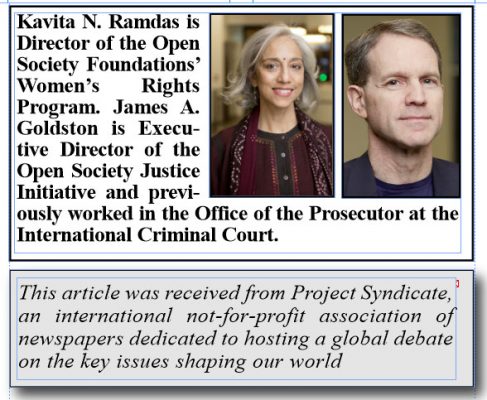 By Kavita N. Ramdas and James A. Goldston
By Kavita N. Ramdas and James A. Goldston
NEW YORK – The United Nations Security Council has just adopted a resolution aimed at ending the use of sexual violence as a weapon during war. This is a laudable goal, which the United States has long supported. But the resolution will do little to achieve it, and it is America’s fault.
Beyond discouraging the use of sexual violence in conflict (including by holding perpetrators to account), Resolution 2467 was supposed to ensure that survivors of such violence receive the support they need. The draft measure included a provision to ensure access to “sexual and reproductive health care” for victims.
For US President Donald Trump’s administration, this was unacceptable; after all, such a provision could include abortion services. So the US threatened to veto the resolution unless the language was removed. America’s allies were furious, but Trump won the day. The resolution – which passed 13-0, with two abstentions – fails to guarantee rape survivors access to critical health-care interventions such as emergency contraception, HIV prevention, and safe termination of pregnancy.
This was not the first time multilateral human-rights organizations have been pressured to eliminate particular language from international legal instruments. In fact, anti-abortion zealots have been working hard in recent years to rewrite international human-rights law according to their hardline beliefs, with increasing success. At the 63rd annual Commission on the Status of Women in March, for example, the US quibbled about the use of language like “gender” and “sexual health” in the non-binding final outcome document, taking positions that one delegate called “bonkers.”
This trend threatens to upend hard-won agreement on definitions of human rights. The UN Security Council is not known for its quick response to threats or challenges to human rights. Language like “sexual and reproductive health care” is the result of decades of debate, spanning several resolutions and reflecting a growing awareness of the needs of survivors.
Worse, thanks to the Trump administration’s linguistic policing, the Security Council may be forced to revisit long-settled legal protections and global norms, including the codification of rape and related offenses as war crimes and crimes against humanity.
Though rape has long been a horrific feature of armed conflict, the international community did not always consider it to be a war crime. That categorization – one of international law’s great successes – was the result of decades of successful organizing by women’s movements and rape survivors. The world should be building on this achievement – and the leadership of successive US administrations – to strengthen enforcement and accountability; instead, we are at risk of backsliding.
The Trump administration is heightening this risk by leveraging aid money to impose its will on global health organizations. One of the administration’s first acts was to reinstate the so-called global gag rule, according to which any NGO that provides information about abortion services or advocates for full reproductive freedom will lose all US funding, including support for unrelated interventions in areas such as child health and tuberculosis.
In line with this rule, Secretary of State Mike Pompeo recently announced that the US would reduce funding for the Organization of American States, because an autonomous arm of the OAS, the Inter-American Commission on Human Rights, had conducted abortion-related advocacy.
We at the Open Society Foundations stood with a group of 50 civil-society organizations and experts to echo previous calls by members of the US Congress and former IACHR commissioners and nominees to maintain funding for the organization.
High-level efforts to control women’s bodies amount to an early warning sign of authoritarianism. It is no coincidence that the Trump administration’s stance put it on the same side as countries like Bahrain, Russia, and Saudi Arabia. Like these repressive regimes – all human-rights violators and enemies of gender justice – the Trump administration seems to view female empowerment as a threat to the patriarchal status quo.
But women and gender-variant people are not sitting by idly as extremist governments seek to silence, control, and disempower them. In India, two women in January defied a centuries-old ban – supported by the ruling Bharatiya Janata Party – on entering a Hindu temple while menstruating. In Afghanistan, women are fighting for a voice in talks with the Taliban, in order to ensure that their rights are protected. From #MeToo to #EleNao and the “green wave” in Latin America, women-led movements are organizing and taking a stand for all of us to live in open societies.
After the vote on Resolution 2467, the US State Department declared, “We understand and agree that more needs to be done to deter the recurrence of [sexual] crimes and assist survivors.” If that is true, the US should stop participating in the ongoing assault on the dignity and autonomy of women and gender-variant people. Their rights are human rights.
Copyright: Project Syndicate, 2019.

